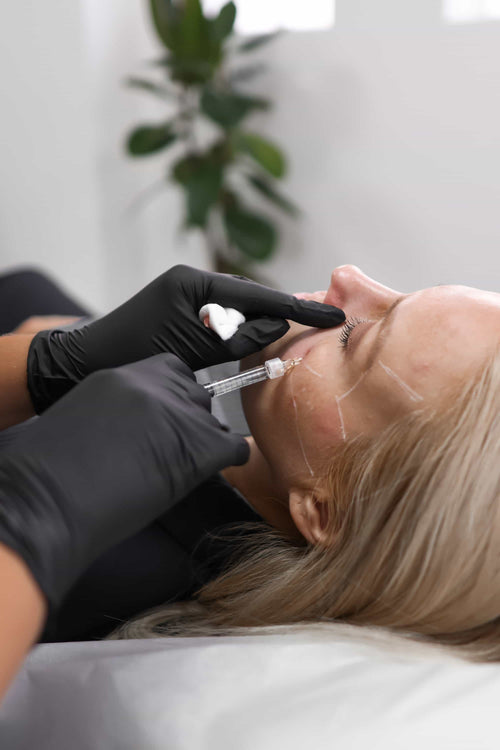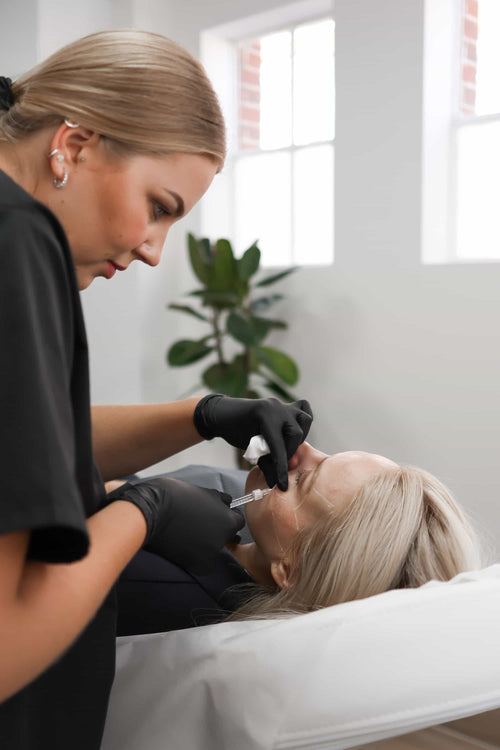Get Your Dermal Filler Consultation with Dr. Laura Geige
## Understanding Ibuprofen’s Impact
Ibuprofen, a widely used nonsteroidal anti-inflammatory drug (NSAID), effectively manages pain and reduces inflammation. Its mechanism of action involves inhibiting the production of prostaglandins, chemicals responsible for pain and swelling.
When considering ibuprofen after lip filler, it’s crucial to understand its potential impact on the injection site.
Ibuprofen can thin the blood, increasing the risk of bleeding or bruising. This is especially relevant in the days following lip filler injections, as the area is already prone to some swelling and potential bleeding due to the procedure itself.
While ibuprofen might offer temporary pain relief from post-injection discomfort, the increased bleeding risk outweighs this benefit. Swelling and inflammation are a natural part of the healing process, and they typically subside within a few days.
If you experience significant pain or swelling after lip filler injections, consult your injector or physician for appropriate pain management options. They may recommend alternative medications or therapies that minimize the risks associated with blood thinning.
### The Science Behind Lip Filler Reactions
Lip filler reactions occur when the body’s immune system identifies the hyaluronic acid (HA) in dermal fillers as a foreign substance and mounts a response.
Hyaluronic acid, while naturally found in our bodies, can trigger an inflammatory reaction when injected.
This reaction is characterized by swelling, redness, tenderness, and sometimes even itching around the injection site. The severity of these reactions varies from person to person and depends on factors like the amount of filler used, individual sensitivity, and the specific type of HA filler.

The immune response typically peaks within the first few days after injection and then gradually subsides as the body begins to break down the hyaluronic acid.
While ibuprofen is a common pain reliever, it can potentially interfere with this process. Ibuprofen is a nonsteroidal anti-inflammatory drug (NSAID) that works by reducing the production of prostaglandins, which are chemicals involved in inflammation.
By suppressing inflammation, ibuprofen might hinder the body’s natural ability to clear the filler and resolve the reaction.
The specific timeframe for avoiding ibuprofen after lip filler depends on individual circumstances and your doctor’s recommendations. However, it is generally advised to avoid NSAIDs like ibuprofen for at least 24-48 hours following the procedure.
### The Potential for Thinning
Thinning hair, also known as _hair loss_ , is a common concern for many individuals, and it can occur at any age. There are numerous factors that can contribute to thinning hair, including genetics, hormonal imbalances, medical conditions, medications, nutritional deficiencies, and stress.
Understanding the underlying cause of hair thinning is crucial in determining the appropriate treatment approach.
Genetic predisposition, often referred to as _androgenetic alopecia_, is a major contributor to hair loss, particularly in men. This type of hair loss typically manifests as a receding hairline and thinning on the crown of the head.
Hormonal fluctuations, such as those experienced during pregnancy, menopause, or thyroid disorders, can also lead to temporary or permanent hair thinning. Medications, including certain antidepressants, blood thinners, and chemotherapy drugs, can also have adverse effects on hair growth.
Nutritional deficiencies, particularly in iron, zinc, and vitamin D, are linked to hair loss. Stress, both physical and emotional, can disrupt the normal hair growth cycle and contribute to thinning.
There are various treatments available for hair thinning, ranging from lifestyle modifications to medications and medical procedures.
Addressing nutritional deficiencies through diet or supplements may be beneficial. Managing stress through techniques such as yoga, meditation, or exercise can also help promote healthy hair growth.
Medications, such as _finasteride_ and _minoxidil_, can help slow down hair loss and stimulate new hair growth.
In more severe cases, hair transplantation surgery may be considered to restore hair density.
## Timing is Everything
Timing plays a crucial role when considering the use of ibuprofen after lip filler treatment.

Ibuprofen is a nonsteroidal anti-inflammatory drug (NSAID) that can thin the blood and increase bleeding. Following lip augmentation with filler, it’s essential to minimize the risk of bruising, swelling, and potential complications.
It’s generally recommended to avoid ibuprofen for at least 24-48 hours after lip filler injections. This timeframe allows the filler to settle into place and minimizes the chance of disrupting the injection sites.
During this initial period, it’s important to opt for alternative pain management strategies such as ice packs, cold compresses, or over-the-counter pain relievers that are safe for use after filler, such as acetaminophen (Tylenol).
Always consult with your physician or a qualified aesthetic injector before taking any medications, including ibuprofen, after receiving lip fillers.
Schedule a Consultation for Dermal Fillers with Dr. Laura Geige
They can provide personalized advice based on your individual medical history, the type of filler used, and your specific needs.
When to Exercise Caution
Assessing Your Individual Needs
## Seeking Professional Guidance
Assessing your individual needs is crucial before taking any medication, including ibuprofen, especially after a procedure like lip filler.
Consider these factors:
1. **Reason for Taking Ibuprofen:** Are you experiencing pain or swelling related to the lip filler? Is it for a pre-existing medical condition unrelated to the treatment?
Schedule Your Dermal Filler Session with Dr. Laura Geige
2. **Severity of Symptoms:** Mild discomfort might not warrant ibuprofen, while significant swelling and pain may benefit from it.
3. **Medical History:** Do you have any allergies or sensitivities to NSAIDs like ibuprofen? Are you on blood thinners or other medications that could interact with ibuprofen?
4. **Lip Filler Type:** Different types of fillers may have varying recovery timelines and potential risks associated with ibuprofen.
5. **Instructions from Your Provider:** Always follow your injector’s specific recommendations regarding medication use after lip filler treatment.
Seeking professional guidance is essential when in doubt. Consult your physician or the provider who administered the lip filler. They can assess your individual circumstances, medical history, and potential risks to determine if ibuprofen is appropriate for you at this time.
Consulting with a Dermatologist or Plastic Surgeon
Importance of Personalized Advice
Bronzed Body Spray Tan K Aesthetics Studio Fringe Beverly Hills Zoe Mallett Coaching Dejour Magazine Made by Penny
- Why Does My Lip Filler Look Bigger Some Days - November 6, 2025
- What Is The Difference Between CBD Gummy Sweets And Other Edibles - November 4, 2025
- What Are The Best CBD Gummy Sweets For Energy - November 1, 2025

